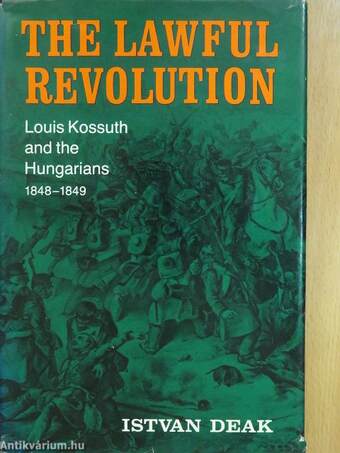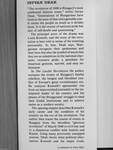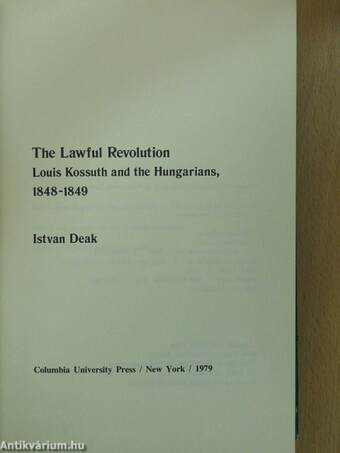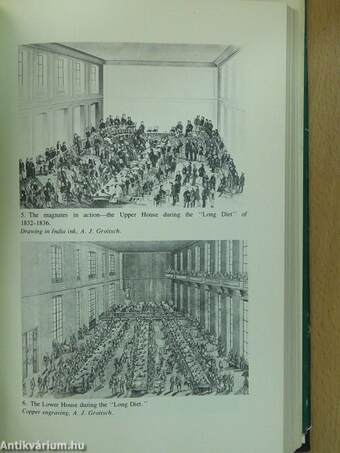1.067.715
kiadvánnyal nyújtjuk Magyarország legnagyobb antikvár könyv-kínálatát

VISSZA
A TETEJÉRE
JAVASLATOKÉszre-
vételek
The Lawful Revolution (dedikált példány)
Louis Kossuth and the Hungarians 1848-1849
| Kiadó: | Columbia University Press |
|---|---|
| Kiadás helye: | New York |
| Kiadás éve: | |
| Kötés típusa: | Vászon |
| Oldalszám: | 429 oldal |
| Sorozatcím: | |
| Kötetszám: | |
| Nyelv: | Angol |
| Méret: | 24 cm x 16 cm |
| ISBN: | 0-231-04602-2 |
| Megjegyzés: | Deák István szerző által dedikált példány. Fekete-fehér illusztrációkkal. |
naponta értesítjük a beérkező friss
kiadványokról
naponta értesítjük a beérkező friss
kiadványokról
Fülszöveg
ISTVÁN DEAK
"The revolution of 1848 is Hungary's most
celebrated historic event," writes Istvan
Deak. "Generations of Hungarians have
lived in the aura of that unforgettable year.
It unites the people as much as it divides
them. It is the source of national pride but
also of self-doubt and questioning."
The principal actor of the drama was
Louis Kossuth, and the story of the revo-
lution is here told in terms of his towering
personality. In him, Deak says, Hun-
garians recognize their spokesman and
their hero but also the symbol of much that
they see as calamitous in the national char-
acter: excessive pride, a penchant for
theatrical gestures, naivete, and easy en-
thusiasm.
In The Lawful Revolution the author
recreates the events of Hungary's fateful
rebellion, the longest and bloodiest con-
flict of Europe's great revolutionary era.
He analyzes Kossuth's spectacular rise
from an impoverished journalist to the un-
disputed leader of his country and the... Tovább
Fülszöveg
ISTVÁN DEAK
"The revolution of 1848 is Hungary's most
celebrated historic event," writes Istvan
Deak. "Generations of Hungarians have
lived in the aura of that unforgettable year.
It unites the people as much as it divides
them. It is the source of national pride but
also of self-doubt and questioning."
The principal actor of the drama was
Louis Kossuth, and the story of the revo-
lution is here told in terms of his towering
personality. In him, Deak says, Hun-
garians recognize their spokesman and
their hero but also the symbol of much that
they see as calamitous in the national char-
acter: excessive pride, a penchant for
theatrical gestures, naivete, and easy en-
thusiasm.
In The Lawful Revolution the author
recreates the events of Hungary's fateful
rebellion, the longest and bloodiest con-
flict of Europe's great revolutionary era.
He analyzes Kossuth's spectacular rise
from an impoverished journalist to the un-
disputed leader of his country and the
phases of the Hungarians' struggle to shed
their feudal institutions and to achieve
status as a modern society.
The opening chapter describes Kossuth's
early career and the condition of his
country on the eve of the revolution. The
author then traces the course of events in
Hungary from the bloodless "glorious
revolution" of March 1848 to civil war and
to a disastrous conflict with Austria and
Russia. Using many previously untapped
sources, Deak shows what political alter-
natives Kossuth and his major rivals,
(continued on back flap) Vissza
Témakörök
- Idegennyelv > Idegennyelvű könyvek > Angol > Történelem > Európa története > Magyarország története
- Történelem > Idegennyelvű > Angol
- Történelem > Politika > Belpolitika > Egyéb
- Történelem > Magyarország története és személyiségei > Magyarország a Habsburg-birodalomban (1686-1914) > Reformkor > Kossuth Lajos
- Történelem > Magyarország története és személyiségei > Magyarország a Habsburg-birodalomban (1686-1914) > 1848-49-es forradalom
- Történelem > Monográfiák > Magyar történelem
- Történelem > Hadtörténet > Háborúk, csaták
- Dedikált, aláírt kiadványok > Idegennyelv > Szerző által > Dedikált kötetek
- Dedikált, aláírt kiadványok > Történelem > Hadászat, hadtörténet > Szerző által > Dedikált kötetek
- Dedikált, aláírt kiadványok > Történelem > Magyar történelem > Szerző által > Dedikált kötetek
- Dedikált, aláírt kiadványok > Történelem > Monográfia, lexikon > Szerző által > Dedikált kötetek
- Idegennyelv > Dedikált, aláírt kötetek > Szerző által > Dedikált kötetek
- Történelem > Dedikált, aláírt kötetek > Szerző által > Dedikált kötetek
Megvásárolható példányok
Nincs megvásárolható példány
A könyv összes megrendelhető példánya elfogyott. Ha kívánja, előjegyezheti a könyvet, és amint a könyv egy újabb példánya elérhető lesz, értesítjük.









